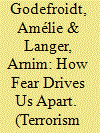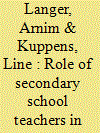|
|
|
Sort Order |
|
|
|
Items / Page
|
|
|
|
|
|
|
| Srl | Item |
| 1 |
ID:
137573


|
|
|
|
|
| Summary/Abstract |
Americans tend to think of affirmative action as a uniquely American institution: an outgrowth of the civil rights movement, intended primarily to improve economic opportunities for African Americans, who have continued to face obstacles to equality long after the Jim Crow era of segregation and overt discrimination. And it is true that as part of the Civil Rights Act of 1964, the U.S. government began to implement affirmative action policies.
|
|
|
|
|
|
|
|
|
|
|
|
|
|
|
|
| 2 |
ID:
175734


|
|
|
|
|
| Summary/Abstract |
A central aim of terrorism is to drive people apart and destroy social trust. Still, there is little empirical research which has systematically investigated the relationship between terrorist attacks, fear of terrorism, and social trust. In addition, the impact of terrorism is usually assumed to be uniform across different individuals and societies. In order to investigate the impact of terrorism as well as the fear of future terrorism on trust levels of different types of individuals and societies, we combine individual-level survey data of the most recent World Values Survey (WVS, Round 6, 2010–2014) with several indicators at the country-level. Our findings show that social trust is principally damaged by the fear of future terrorist attacks, more so than by past terrorist attacks. Moreover, this deleterious impact of the fear of terrorism on social trust is most prevalent in more democratic countries and among individuals who are more frequently exposed to television news. Hence, with relatively limited capabilities and resources, terrorists may therefore evoke disproportionate fear effects within democratic societies which are, at least partially, fueled by media exposure.
|
|
|
|
|
|
|
|
|
|
|
|
|
|
|
|
| 3 |
ID:
154358


|
|
|
|
|
| Summary/Abstract |
The causes and consequences of the Boko Haram insurgency as well as its possible solutions have been subjected to different interpretations among scholars, politicians, and journalists. Little is known, however, about how the Nigerian populace thinks about the uprising. The present study contributes to the literature on Boko Haram by analyzing the perceptions of Nigerian students vis-à-vis Boko Haram's agenda and the government's response. The results demonstrate a north–south divide with Christians or Igbo and Muslims or Hausa-Fulani holding different ideas on the causes of the crisis, being differently affected by it, and slightly disagreeing on the desirability of military government responses. In conclusion, perceptions on Boko Haram lay bare ethno-religious fault lines reflecting existing grievances, thereby possibly undermining efforts at nation-building and peaceful coexistence in the multi-ethnic Nigerian society.
|
|
|
|
|
|
|
|
|
|
|
|
|
|
|
|
| 4 |
ID:
191846


|
|
|
|
|
| Summary/Abstract |
Since Kenya's independence in 1963, ethnicity has been an important factor in Kenyan politics and everyday life. While recent research has shown that ethnic favouritism impacted the allocation of educational resources in the past, so far, no systematic research has been conducted on how teachers exacerbate, mitigate or countervail the political culture of ethnicity and ethnic favouritism. As agents of socialisation, teachers’ attitudes and behaviour can, consciously or unconsciously, convey the message that ethnic favouritism is normal and socially acceptable, or conversely delegitimise such practices. Based on a list experiment among 894 secondary school teachers in the county of Nairobi, we find that at least 25% of teachers have already favoured coethnic pupils. Interviews indicate that such favours are seldom blatant in nature and mainly serve to show solidarity with one's kin. Still, even small – frequently well-intentioned – favours may damage inter-group attitudes, trust and relations, and may even contribute to the persistence of ethnic politics.
|
|
|
|
|
|
|
|
|
|
|
|
|
|
|
|
| 5 |
ID:
190878


|
|
|
|
|
| Summary/Abstract |
Reintegrating ex-combatants back into society is one of the most challenging, yet fundamental components to building sustainable peace. While previous work has extensively evaluated the reintegration trajectories of ex-combatants, there is still little understanding of how citizens think about reintegration. In this article, we systematically analyze which former fighters people prefer to reintegrate into society. Based on theories of threat and justice, we develop a heuristic framework that explains how information about the motivations and behavior of ex-combatants shapes public preferences about whom to reintegrate. We test this framework using a conjoint experiment conducted among approximately 2,000 (former) university students in Nigeria. We find that our respondents are more forgiving towards former fighters who were forced to join the insurgency and expressed remorse afterwards, while being less willing to reintegrate more militant and less repentant offenders. Similar informational cues shape respondents’ evaluations of how successful the reintegration process would be and what punishment would be appropriate. Taken together, the results underscore the importance of perceptions of risk and fairness in driving attitudes towards reintegration. Finally, subgroup analyses revealed that these heuristics are broadly held across different demographic and conflict-related fault lines. While caution is warranted when generalizing these results, insights gained in this specific context are nonetheless an important step towards advancing our understanding of reintegration processes in conflict-affected countries.
|
|
|
|
|
|
|
|
|
|
|
|
|
|
|
|
|
|
|
|
|